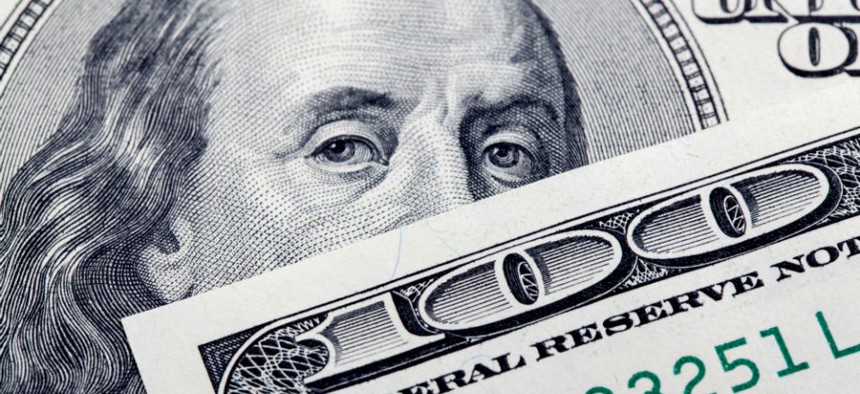
Maks Narodenko/Shutterstock.com
How Companies Hide the Spoils of Winning Government Contracts
What about the deals that result from a corporation's heavy political spending?
General Electric, the venerable maker of light bulbs, refrigerators, and other appliances, recently announced that it was selling off its consumer products division because the profit margins are too low. While GE bids that division goodbye, it’s holding onto its highly lucrative government-contracting business, in which a less-demanding customer leaves room for higher margins. Between 2007 and 2012, GE secured more than $16 billion worth of federal contracts, which might have something to do with the fact that it spent $150 million on lobbying during that period.
How often do these sorts of contracts roll in for companies that spend heavily on political advocacy? Unfortunately, there's not enough public information to say.
Journalists and critics frequently bring up the dizzying totals that special interests put into elections—one estimate was that $3.7 billion was spent on last month’s midterms—but it's much less common to hear about the impact of that money on the government's decision-making.
The Sunlight Foundation, where I work, recently examined 200 of the most politically active for-profit corporations between 2007 and 2012. We found that while they disclosed spending $5.8 billion to influence government—in the form of both their lobbying expenses and the campaign contributions from their PACs, employees, and their employees' family members—they got, as far as we can determine, more than $4.4 trillion in federal business and support. Which is not to say that their lobbying and campaign spending was the sole reason they got all that money; rather, when corporate business plans include getting a lot of federal money, contributing to candidates and hiring lobbyists will be part of the strategy.
For comparison’s sake, $4.4 trillion is more than the amount that Social Security paid out to roughly 50 million beneficiaries over the same six-year period. Still, that figure is woefully incomplete. Though the federal government has begun disclosing more information on its transactions with the private sector, much more remains to be done. Sites such as USASpending.gov offer information—albeit late, flawed and sometimes wildly inaccurate—on government contracts, grants and loans, but far too many other figures remain hidden.
Arch Coal, one of the big donors we looked at, lists the Tennessee Valley Authority as one of its three biggest customers in its annual reports. We have no idea exactly how good a customer TVA is, however, because though it’s a government-owned corporation, it’s exempt from publishing information on its contracts. Similarly, Wal-Mart has disclosed to investors that it sells so many groceries to customers who purchase them with food stamps that cuts to the Supplemental Nutrition Assistance Program would hurt its bottom line. Yet the amount of money the company gets from the program isn’t made public. The same holds true for other transactions between government and the private sector, whether it’s the royalties energy firms pay for drilling on federal lands or the full extent of the Federal Reserve’s efforts to bail out banks and other financial institutions in the wake of the 2008 financial crisis.
“Too often the American people don’t know who Washington is working for,” said Barack Obama while campaigning in September 2007, “and when they find out, they don’t like what they hear.” As a first-term senator, he was a co-sponsor of the legislation that created USASpending.gov. In the lead-up to the 2008 election, he promised to create a website that would try to provide information on who benefited not only from federal spending decisions, but also tax breaks and earmarks. But after six years in office, little has changed.
It’s still within Obama’s power to bring those ideas to life. He could start by requiring all governmental agencies to report their spending data to USASpending.gov and expand the kinds of transactions reported to include things like royalties paid by mining and energy companies operating on federal lands and those that profit from public-assistance programs like food stamps. He might ask Congress to require for-profit corporations—not including small businesses—to disclose their tax returns just like nonprofit organizations do. Then he might finally make good on his promise to make the relationship between money and government clearer.
Bill Allison is the editorial director at the Sunlight Foundation and the author of Fixed Fortunes.
(Image via Maks Narodenko/Shutterstock.com)






